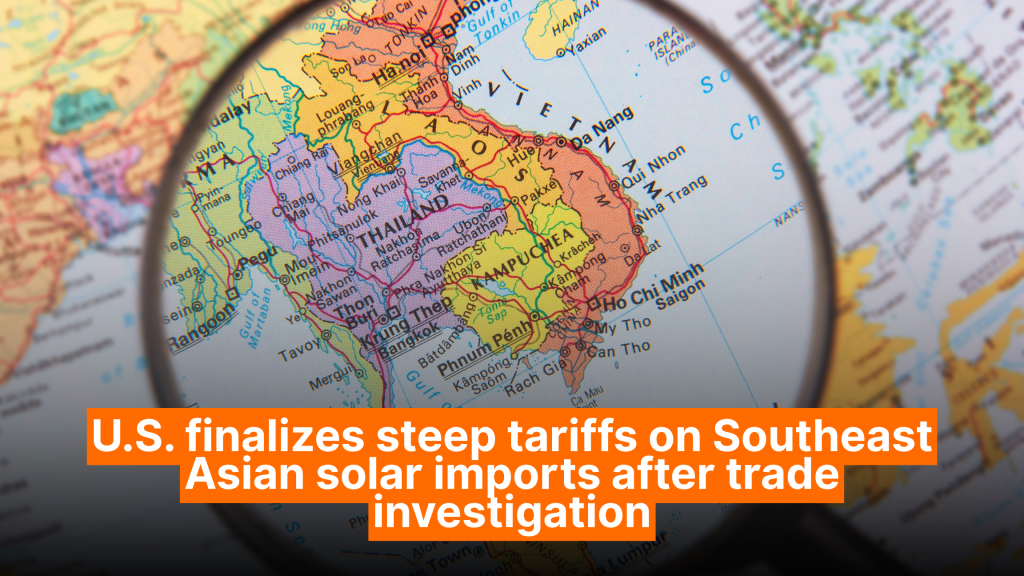The U.S. International Trade Commission (ITC) has issued its final ruling in a major trade case involving silicon solar cells and panels imported from Southeast Asia, concluding that these imports have harmed the domestic solar manufacturing industry.
As detailed by Solar Power World, the ITC’s affirmative determination clears the way for U.S. Customs and Border Protection (CBP) to begin collecting antidumping and countervailing duties (AD/CVD) on products from Cambodia, Malaysia, Thailand, and Vietnam. These tariffs, expected to go into effect by mid-June, follow the Department of Commerce’s final calculations released last month. The imposed rates are substantial: Cambodian products face duties from 650% to 3,500%, Malaysian imports from 14% to 250%, Thai products from 375% to 972%, and Vietnamese goods from 120% to 813%. Detailed rates by company are publicly accessible.
This decision stems from a petition filed in April 2024 by the American Alliance for Solar Manufacturing Trade Committee, a coalition of U.S.-based manufacturers. They argued that Chinese solar companies were shifting production to Southeast Asian nations to bypass existing tariffs on Chinese-origin products. The petition also alleged that these companies were receiving unfair subsidies from host governments, enabling them to undercut U.S. producers with artificially low prices.
The ITC ultimately agreed with the petitioners, adding a new layer of tariffs to those already in place under earlier trade policies.
“Today’s vote leaves no doubt: These Chinese-headquartered companies have been violating trade laws by overwhelming the U.S. market with unfairly cheap, dumped and subsidized solar panels — and they continue to do so from third-party markets around the world, undermining U.S. industrial strategy and stunting new investment. This cannot stand. Our growing American industry deserves — and now will have — the chance to compete fairly,” said Tim Brightbill, co-chair of Wiley’s International Trade Practice and lead counsel to the trade committee.
However, the ruling has sparked concern among other players in the solar sector. The Solar Energy Industries Association (SEIA), which opposed the petition, said today’s affirmative decision is “concerning for American solar manufacturers and the broader U.S. solar industry.”
“The ITC’s final affirmative injury determination adds an additional layer of tariffs that will raise costs for the solar products American companies need to build projects and grow domestic manufacturing,” said SEIA president and CEO Abigail Ross Hopper. “Today, U.S. solar cell manufacturing is growing for the first time in years, but it is still not at the scale needed to meet demand. This determination especially harms U.S. solar module producers that depend on access to imported solar cells as we ramp up domestic cell manufacturing capacity. Imposing additional tariffs on cell imports at this stage risks stalling progress and undermining the very industry they are meant to support.”
In anticipation of these steep duties, imports from the four countries have already declined sharply over recent months.
Mike Carr, Executive Director of the Solar Energy Manufacturers for America (SEMA) Coalition, issued a statement highlighting both the progress and the risks still facing the domestic industry.
With this decision, the non-partisan International Trade Commission affirmed for the third time that Chinese-owned firms continue to cheat our trade laws and undercut U.S. solar manufacturers. This ruling is a step forward in addressing China’s continuing efforts to undermine the U.S. manufacturing rebuilding effort. Unfortunately, Congress appears to be about to take two steps back by retroactively repealing the tax incentives to purchase domestic products. If the bill becomes law in its current form, domestic factories will close before they’ve even been allowed to fully open. All the trade protections in the world won’t make a difference if Congress backtracks on its commitments to reshore this critical industry.”
The Department of Commerce is scheduled to issue its formal tariff orders on June 9. CBP will begin collecting duties on applicable imports starting June 16.

